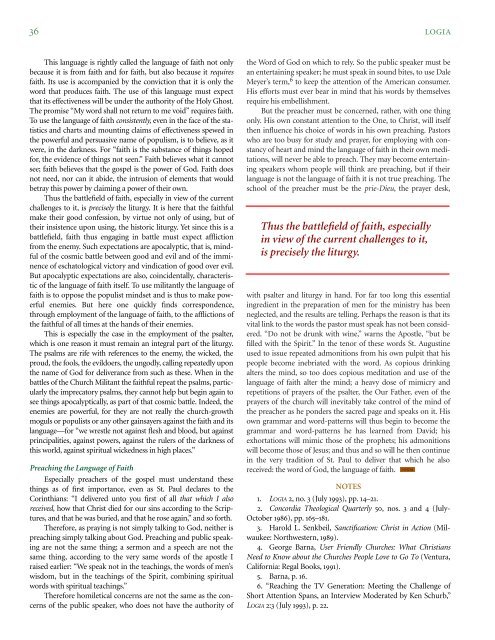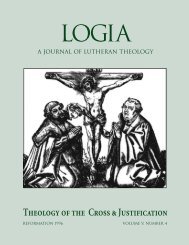04-2 Hermeneutics.pdf
04-2 Hermeneutics.pdf
04-2 Hermeneutics.pdf
- No tags were found...
Create successful ePaper yourself
Turn your PDF publications into a flip-book with our unique Google optimized e-Paper software.
36 LOGIAThis language is rightly called the language of faith not onlybecause it is from faith and for faith, but also because it requiresfaith. Its use is accompanied by the conviction that it is only theword that produces faith. The use of this language must expectthat its effectiveness will be under the authority of the Holy Ghost.The promise “My word shall not return to me void” requires faith.To use the language of faith consistently, even in the face of the statisticsand charts and mounting claims of effectiveness spewed inthe powerful and persuasive name of populism, is to believe, as itwere, in the darkness. For “faith is the substance of things hopedfor, the evidence of things not seen.” Faith believes what it cannotsee; faith believes that the gospel is the power of God. Faith doesnot need, nor can it abide, the intrusion of elements that wouldbetray this power by claiming a power of their own.Thus the battlefield of faith, especially in view of the currentchallenges to it, is precisely the liturgy. It is here that the faithfulmake their good confession, by virtue not only of using, but oftheir insistence upon using, the historic liturgy. Yet since this is abattlefield, faith thus engaging in battle must expect afflictionfrom the enemy. Such expectations are apocalyptic, that is, mindfulof the cosmic battle between good and evil and of the imminenceof eschatological victory and vindication of good over evil.But apocalyptic expectations are also, coincidentally, characteristicof the language of faith itself. To use militantly the language offaith is to oppose the populist mindset and is thus to make powerfulenemies. But here one quickly finds correspondence,through employment of the language of faith, to the afflictions ofthe faithful of all times at the hands of their enemies.This is especially the case in the employment of the psalter,which is one reason it must remain an integral part of the liturgy.The psalms are rife with references to the enemy, the wicked, theproud, the fools, the evildoers, the ungodly, calling repeatedly uponthe name of God for deliverance from such as these. When in thebattles of the Church Militant the faithful repeat the psalms, particularlythe imprecatory psalms, they cannot help but begin again tosee things apocalyptically, as part of that cosmic battle. Indeed, theenemies are powerful, for they are not really the church-growthmoguls or populists or any other gainsayers against the faith and itslanguage—for “we wrestle not against flesh and blood, but againstprincipalities, against powers, against the rulers of the darkness ofthis world, against spiritual wickedness in high places.”Preaching the Language of FaithEspecially preachers of the gospel must understand thesethings as of first importance, even as St. Paul declares to theCorinthians: “I delivered unto you first of all that which I alsoreceived, how that Christ died for our sins according to the Scriptures,and that he was buried, and that he rose again,” and so forth.Therefore, as praying is not simply talking to God, neither ispreaching simply talking about God. Preaching and public speakingare not the same thing; a sermon and a speech are not thesame thing, according to the very same words of the apostle Iraised earlier: “We speak not in the teachings, the words of men’swisdom, but in the teachings of the Spirit, combining spiritualwords with spiritual teachings.”Therefore homiletical concerns are not the same as the concernsof the public speaker, who does not have the authority ofthe Word of God on which to rely. So the public speaker must bean entertaining speaker; he must speak in sound bites, to use DaleMeyer’s term, 6 to keep the attention of the American consumer.His efforts must ever bear in mind that his words by themselvesrequire his embellishment.But the preacher must be concerned, rather, with one thingonly. His own constant attention to the One, to Christ, will itselfthen influence his choice of words in his own preaching. Pastorswho are too busy for study and prayer, for employing with constancyof heart and mind the language of faith in their own meditations,will never be able to preach. They may become entertainingspeakers whom people will think are preaching, but if theirlanguage is not the language of faith it is not true preaching. Theschool of the preacher must be the prie-Dieu, the prayer desk,Thus the battlefield of faith, especiallyin view of the current challenges to it,is precisely the liturgy.nbwith psalter and liturgy in hand. For far too long this essentialingredient in the preparation of men for the ministry has beenneglected, and the results are telling. Perhaps the reason is that itsvital link to the words the pastor must speak has not been considered.“Do not be drunk with wine,” warns the Apostle, “but befilled with the Spirit.” In the tenor of these words St. Augustineused to issue repeated admonitions from his own pulpit that hispeople become inebriated with the word. As copious drinkingalters the mind, so too does copious meditation and use of thelanguage of faith alter the mind; a heavy dose of mimicry andrepetitions of prayers of the psalter, the Our Father, even of theprayers of the church will inevitably take control of the mind ofthe preacher as he ponders the sacred page and speaks on it. Hisown grammar and word-patterns will thus begin to become thegrammar and word-patterns he has learned from David; hisexhortations will mimic those of the prophets; his admonitionswill become those of Jesus; and thus and so will he then continuein the very tradition of St. Paul to deliver that which he alsoreceived: the word of God, the language of faith. LOGIANOTES1. LOGIA 2, no. 3 (July 1993), pp. 14–21.2. Concordia Theological Quarterly 50, nos. 3 and 4 (July-October 1986), pp. 165–181.3. Harold L. Senkbeil, Sanctification: Christ in Action (Milwaukee:Northwestern, 1989).4. George Barna, User Friendly Churches: What ChristiansNeed to Know about the Churches People Love to Go To (Ventura,California: Regal Books, 1991).5. Barna, p. 16.6. “Reaching the TV Generation: Meeting the Challenge ofShort Attention Spans, an Interview Moderated by Ken Schurb,”LOGIA 2:3 (July 1993), p. 22.
















